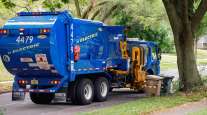Critical Wisconsin DOT Audit Finds Highway Project Costs Underestimated by $3 Billion

A new state audit says the Wisconsin Department of Transportation dramatically underestimated the cost of major highway projects by failing to account for inflation, with costs on 16 major projects ballooning by more than $3 billion since lawmakers approved them.
Combined cost estimates for the projects — some nearly completed, others barely under way — now are nearly $5.8 billion. That's more than double what the department estimated when the projects were written into law.
The much-anticipated findings were released Jan. 26 by the Legislative Audit Bureau.
The audit is sharply critical of planning and management efforts at Gov. Scott Walker's DOT, the latest blow to an agency that just underwent a top-level management shakeup.
Sen. Rob Cowles, co-chairman of the Legislature's Joint Audit Committee, called the findings "unacceptable" in a release.
RELATED: Wisconsin's transportation-funding problem - possible solutions, and how we got here
"This audit should serve as a resource to tighten up DOT practices so that future cost estimates correctly reflect true costs,” said Cowles (R-Green Bay).
The findings also will likely give fodder to both sides in the ongoing debate over the state's next transportation budget. Some statehouse Republicans say more money is needed for roads and transit; their opponents, including Walker, say the DOT must do more with existing resources.
Walker spokesman Tom Evenson, responding to the audit Jan. 26, said the governor is still resistant to raising the gas tax, an issue over which he has clashed with Assembly Republicans.
"The bottom line is we shouldn’t even be thinking about raising the gas tax or fees until we find every last cost savings at the DOT, and the audit shows we can find more savings," Evenson said. "We welcome the opportunity to deliver services taxpayers expect at a price they can afford."
RELATED: Feds warn Wisconsin to hold off on plans for major new roads
In an interview, Cowles said the results make him less likely to support an increase in transportation revenue before the agency tightens up its practices, even though such tightening could mean the agency will need more money to fund projects already approved.
"Why would you give an entity more money when you haven’t tightened up the various management recommendations?" Cowles said. "If those things had been done correctly up front, not as many projects would have been approved by the Legislature."
Democrats such as Sen. Jon Erpenbach, (D-Middleton) a member of the Legislature's joint budget panel, said the audit underscores Walker's failure to properly fund the state's roads and bridges.
"Our infrastructure is falling apart before our eyes," Erpenbach said. "The governor has not come up with a plan."
RELATED: Wisconsin DOT study finds tolls would raise billions for state highways, boost travel costs
The huge increases in project cost estimates are due to the department not sufficiently budgeting for inflation and "unexpected cost increases," the audit found. As a result, the department budgeted more work than it could complete with the funds it was given.
The department could take additional steps to find "considerable additional savings" on highway projects, the audit found.
It found the department could have saved $192 million, or an average of $32 million a year, from fiscal year 2009-2010 through fiscal 2014-2015 if costs during the construction phase of state highway projects had not exceeded performance goals.
The audit contains several findings that suggest Wisconsin highways compare poorly with other states — and that the condition of Wisconsin highways has worsened significantly in recent years.
The proportion of state highways rated in good condition decreased from 53.5% in 2010 to 41.0% in 2015 under the department's rating system, the audit found.
Using a different index employed by the Federal Highway Administration, the audit found 32.2% of Wisconsin state highways are in "good condition," far less than any Midwestern state. The next closest was Iowa, which had 55.3% of highways in good condition.
Assembly Republican leaders and some advocacy groups say more funds are needed — likely through gas tax or fee increases — to keep the state's roads, bridges and transit from deteriorating.
Peter Skopec, executive director of the liberal Wisconsin Public Interest Research Group, said the audit also raises the question of whether the state is setting the right priorities for transportation spending.
"We’ll never have enough money to do absolutely everything on the state's wish list, from expanding or rebuilding major highways to fixing local roads or improving transit," Skopec said. "Budgets are ultimately about making choices, and we’ve chosen to prioritize spending on major highways over other investments over the last few decades, at the expense of other needs. The audit shows that this has cost even more money than expected."
Walker and his legislative allies, some of the Legislature's most staunchly conservative members, have maintained their opposition to tax and fee increases, saying cost savings can be found within the department. The budget request put forward by Walker also would cause widespread delays to highway projects statewide.
The agency recently got new leadership. Former Transportation Secretary Mark Gottlieb resigned in December and was replaced this month by Dave Ross, the former mayor of Superior.
Ross released a statement Jan. 26 saying his goal for the DOT "is to maximize Wisconsin’s transportation infrastructure without increasing the burden on taxpayers."
"The Legislative Audit Bureau report provides a road map to improved efficiency and transparency at the DOT. As the new Secretary, I couldn’t ask for more timely help," Ross said.




